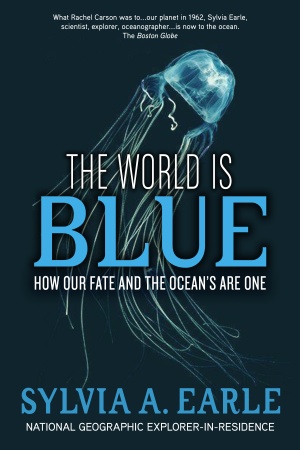The World Is Blue: How Our Fate and the Ocean’s Are One – Sylvia Earle

Sylvia Earle is a legend (I’ve said so before), and this is a book that flowed out of a TED talk she gave about the need to take urgent action on ocean conservation. I gained a huge amount of understanding about why indiscriminate fishing is a problem for ecosystems (she compares it to removing bits from a computer that look useless, and then expecting it to work afterwards). She also explains the extent of our dependency on the ocean – for example, one kind of plankton provides about 20% of the oxygen we breathe, with other kinds making up a further 50%.
Earle has a long history of ocean exploration, and has been scuba diving and driving submersibles since the 1950s. Her anecdotes about things she has seen and people she has spoken to are fascinating. She was part of the very early days of ocean exploration and recreational scuba diving, and has spent thousands of hours underwater (for comparison, I think I’ve spent only 40 hours breathing compressed air!).
Earle is a strong advocate for Marine Protected Areas – proper ones, that don’t allow fishing. She likens a MPA that allows fishing to a game park – say Kruger – that allows hunting! She also supports the initiatives such as SASSI that classify fish species according to the sustainability of the catch process and their level of endangerment. (If you don’t have a SASSI card, you need to get one before your next seafood dinner!)
I was particularly struck by Earle’s account of her response to a question asked of her in the 1990s by the head of the Japanese delegation at the International Whaling Commission: “… What’s the difference between eating a steak from a cow and eating whale meat?”
I tried to respond seriously: Cows are herbivores and go to market in a year or two, have been cultivated by people for food for ages, and require care and an investment of some sort by farmers; while whales are free, wild beings that belong to no one, are typically taken after they have lived for decades, and are relatively few in numbers (or are not “restocked” like cows), leaving an irreversible tear in the ocean’s fabric of life when removed. There are billions of cows, but all whale species are greatly reduced in number, some bordering on extinction owing to whaling. Taking even a few increases the risk of depletion owing to other pressures – storms, disesase, pollution, and fluctuating food sources. The whales of today have ancestral roots 65 million years deep, and nothing in their survival strategies factored in the impact of humans as predators. What might we learn from them as living creatures, able to communicate with sound over long distances, develop close-knit societies, navigate over thousands of miles with no maps, and perform daily deep-diving feats that defy the capacity of even the most athletic humans? If only considering whales as a priceless source of knowledge, we discover that their value alive far exceeds their worth as pounds of meat. In narrowly-defined economic terms, the growing business of whale-watching is lucrative and demonstrably sustainable, while commercial whaling is subsidised, with a consistent record of “management” failure.
The World is Blue, Sylvia A. Earle, National Geographic Press 2009, pp 38-39.
Buy the book here if you’re in South Africa, otherwise click here. If you want to read it on your Kindle, go here. I highly recommend it.








2 thoughts on “Bookshelf: The World is Blue”
Comments are closed.